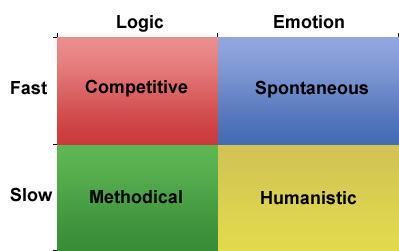Make informed decisions on your landing page and website strategies
Buyer personas are made up representations of your desired customers. They are constructed using real data about customer demographics, research and interviews, along with a heuristic approach to establish their potential goals, motivations and concerns. Models of online buyer behaviour should also be considered.
So why do we need them? Personas allow you to empathise with the people visiting your web pages and help you make informed decisions on your website and landing page conversion optimisation strategies. You’ll produce more targeted and persuasive content and value propositions and more engaging and effective page layouts. All of which cater to your various personas goals, motivations and concerns and online behaviour. Bottom line, you’ll get more (and better) conversions, and a better ROI from your online marketing spend by applying this methodology.
As it’s a large subject, in this post I will first look at the how to generate buyer personas. In later posts I will detail how to use these personas to hypothesise optimal web conversion strategies.
How to generate buyer personas
Who should be involved in the process of creating buyer personas?
Internally the best sources of information are generally from sales and marketing. Sales communicate with the customers every day and generally they have an intrinsic knowledge of the customers goals, motivations and concerns, and know the most effective ways to address them coherently and succinctly.
Marketing equally are unparalleled at being able to disseminate the most important information about the brand/company and product, and are highly practiced at communicating the relevant messages very effectively. If feasible, it can also be very beneficial to interview real customers, who obviously have the clearest insight into their own goals, motivations and concerns.
Establish personas from your customer demographics
Where possible use real marketing data on your customer demographics. As well as this the sales team can give an informed overview of the main customer demographics. Only consider demographic information that is relevant to the product or service being sold. Here are some example demographics that might be considered:
B2B
- Job role
- Company sector
- Company size
- Education level of product/service
- Timescale of purchase
- Budget
B2C
- Age
- Gender
- Budget
- Relevant personality traits
- Education level of product/service in question
- Timescale of purchase
Isolate all your buyer personas, prioritise and differentiate which is important from a business case perspective. We only want to engage and resonate with the personas that actually matter to your business.
Example
Customer persona example for website hosting company targeting the mid-market
Job role: Technical Manager
Company size: 100 people
Knowledge level surrounding website hosting: Good knowledge. Know generally what he needs. Will need some guidance on the exact hosting solution.
Timescale of purchase: Around 2 – 3 months
Budget: Up to £100 a month
Goals, motivations and concerns:
So you’ve established your customers demographics, but they’re not much use on their own. We need to understand their goals, motivations and concerns. As mentioned earlier this can be done using interviews with sales and marketing, the customers themselves, as well as educated speculation. These are the questions you need to be asking:
- What do they want to achieve? (The goals)
- Why do they want to achieve it? (Challenge to personas success)
- What objections will they have with potential solutions?
Run through each of your demographic personas and ask each of these questions about their goals, motivations and concerns. List everything you can think of.
Example
Customer persona example for website hosting company targeting the mid-market
 Peter – Technical Manager
Peter – Technical Manager
What does he want to achieve?
- A stable, fast hosting service with no downtime.
- He also wants minimal hassle to migrate to the new hosting space
- He wants hosting issues to be constantly monitored and managed
Why does he want to achieve it?
- His current hosting service has too much downtime.
- His company has expensive marketing campaign traffic going to their website
- The downtime is costing them money.
What objections/anxieties will he have with potential solutions?
- Does the company offer a 100% service level agreement?
- Will he be stuck in an extended contract if he is unsatisfied with the service?
- Will the hosting migration of his files and database be seamless?
- Will issues be monitored and resolved immediately?
- Will the hosting spec support the current bandwidth and disk space requirement?
- Do they support the relevant scripting and database configurations?
- Do they offer speedy support?
- Have their service claims been verified by third parties?
Online buyer behaviour
Another key area to consider is buyer behaviour personas. Each user is unique, they make purchasing decisions in different ways and the way they interact with websites varies significantly. It’s not possible to tailor your website for each individual user, but we can differentiate visitors by putting them under general categories.
Brian and Jeffery Eisenberg, two authors in conversion optimisation, describe such a model of online buyer behaviour. They highlight four distinct personas of buyer behaviour, outlining how different personas make purchasing decisions; deciding either logically or emotionally, as well as the speed with which they make those decisions. The model looks like this:
Competitive: logical, fast thinkers
-
- Make quick decisions, highly goal-oriented.
- They like to be the first to own a product.
- Respond to new items, featured or best-sellers.
- Does not like to spend long looking for detailed information.
- Interested in cross-sell and up-sell offers.

Spontaneous: emotional, fast thinkers
-
- Quick to make a decision if things feel right
- Responds well to promotions, sales, discounts, limited stock and time-limited offers, free shipping etc…
- Scans pages quickly, likes summaries
- Prefers to see pictures of product being used by someone
- Interested in reviews from others
- May respond well to this type of cross-sale
Humanistic: emotional, slow thinkers
- People-centred and tend to focus on relationships
- Want to know how your product or service has helped others in the past, and they also want to know who will be affected by their purchasing decision
- Cares what others have to say and like to read reviews
- Appreciates customer service
- Engaged with social media, shares findings with friends, co workers
Methodical: logical, slow thinkers
- Like facts
- Already know exactly how your product or solution will help solve their problem They will look for product specifications, detailed comparison charts
- Very thorough in researching a purchase
- Trust expert reviews and credible third party endorsements
- May be sceptical of contests, promotions, cross sells
Next steps
All these aspects of your personas should be considered carefully and thoroughly before planning your website strategy.
Once you’re completely satisfied with your fully formed personas, they should be the centre of your decisions on content, design and structure and value proposition – all of which should be geared at addressing the personas’ goals, motivations and concerns, and should also cater to the various buyer behaviour types.


